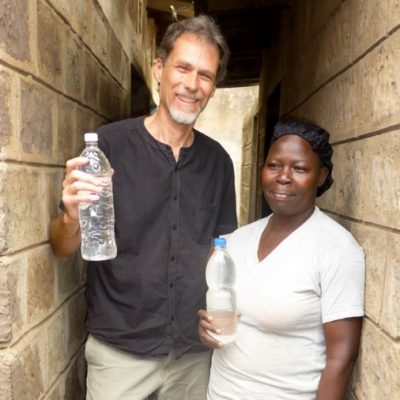Two threads interweave in Doug Graber Neufeld’s life: teaching college students in the U.S. and working on water issues in international settings via Mennonite Central Committee. His new role as the director of the Center for Sustainable Climate Solutions will draw on both of these vocations and perhaps combine them.
As a professor at Eastern Mennonite University (EMU), Harrisonburg, Va., Doug teaches biology and chemistry to undergraduates. His area of expertise involves environmental sustainability, particularly the monitoring of chemical substances and their effects. Doug also works on stream restoration projects in rural mountain communities.
As a Mennonite Central Committee (MCC) worker—first in Cambodia and more recently in Nairobi, Kenya—Doug has helped communities improve their access to clean water. In Kenya, he worked with sand dams for community water harvesting in semi-arid regions and solar disinfection for water supplies in urban slums of Nairobi.
Since returning to the States this summer, Doug continues as a professor at EMU but is also directing the Center for Sustainable Climate Solutions (CSCS) half time. The center is a joint project of Eastern Mennonite University, Goshen College and Mennonite Central Committee, sparked by the generosity of Ray Martin, an EMU alumnus. It aims to help Mennonites to see climate change as the equivalent of violence and to take collective action.
“Connecting MCC to universities was a strong draw for me. Anything that encourages that collaboration excites me,” Doug says. He hopes to connect college students with people around the world impacted by climate change. One such project might be increasing the number of internships that focus on advocacy related to climate change at the MCC Washington Office.
Doug also hopes to equip pastors and congregational leaders to work on climate change. The CSCS began this work earlier in 2017 with a survey that gathered baseline data on Mennonites’ attitudes toward climate change, from alarmed to dismissive.
A third theme will be researching best practices and innovative solutions for climate change adaptation and mitigation efforts.
